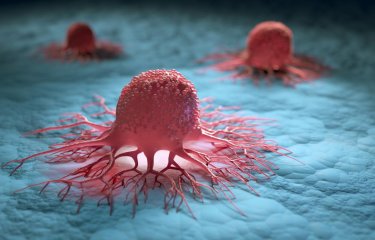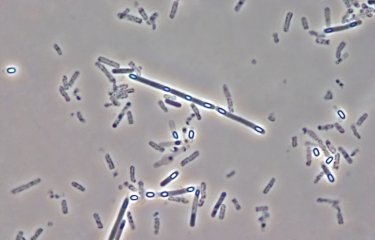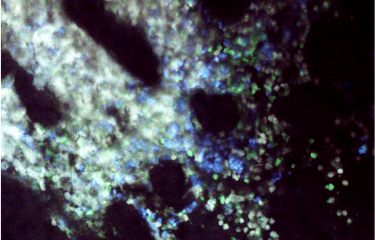The gastroenterology team at Henri-Mondor AP-HP Hospital and University Paris-Est Créteil, led by Professor Iradj Sobhani, together with teams from Inserm and the Institut Pasteur Molecular Microbial Pathogenesis Unit (U1202), led by Professor Philippe Sansonetti – holder of the Microbiology and Infectious Diseases Chair at the Collège de France –, have demonstrated that an imbalance in the gut microbiota, also known as "dysbiosis", promotes the onset of colorectal cancer. The teams, operating as the "Oncomix" group since April 2016, demonstrated that transplanting fecal flora from patients with colon cancer into mice caused lesions and epigenetic changes characteristic of the development of a malignant tumor.
The pilot study, funded by the French National Cancer Institute and promoted by the Paris Public Hospital Network (AP-HP) as part of a hospital program for clinical cancer research (PHRC-K), led to the development of a non-invasive blood test which identifies the epigenetic phenomenon associated with dysbiosis. The test was validated in 1,000 individuals. These findings were published in the journal Proceedings of the National Academy of Sciences (PNAS) on November 11, 2019.
Sporadic colorectal cancer can develop in patients without any known risk factors. It occurs as a result of complex interactions between individuals and their environment. The increasing incidence of this condition reflects negative environmental developments, which can trigger alterations to the genetic and epigenetic DNA of host cells, thereby promoting the onset of sporadic colorectal cancer.
Several studies have investigated the role of the microbiota as a mediator of these interactions. The team in the Gastroenterology Department at Henri-Mondor AP-HP Hospital and University Paris-Est Créteil, together with a team composed of members from Inserm and the Institut Pasteur Molecular Microbial Pathogenesis Unit (U1202), and the Chair in Microbiology and Infectious Diseases at the Collège de France, demonstrated in mice that the epigenetic mechanism triggered by some bacteria in the microbiota contributes to the onset or promotion of sporadic colorectal cancer. They subsequently validated their findings in humans.
The 136 mice in the study were transplanted with either fresh stools from nine patients with sporadic colorectal cancer or fresh stools from nine patients with no colon disorders. The procedure was carried out at Henri-Mondor AP-HP Hospital. The colons of the mice were examined 7 and 14 weeks after the human fecal microbiota transplant. The teams particularly investigated the number and development of aberrant crypt foci (or ACF, a type of precancerous lesion), the microbial profile and damage to colonic DNA. They also took into account the animals' food intake, weight and blood indicators.
A link between fecal dysbiosis (an imbalance in gut bacteria composition) and the genetic and epigenetic DNA signature in the animals' tissues was identified using statistical tests. Mice who had received fresh stools from patients with sporadic colorectal cancer developed precancerous lesions known as aberrant crypt foci (ACF) without any significant genetic changes to the colon, but they had a greater number of hypermethylated genes – which have been significantly linked to the incidence of ACF in the colonic mucosa.
After verifying links between fecal dysbiosis and DNA anomalies (methylation) in the patients with sporadic colorectal cancer who took part in the fecal transplants, a pilot study was carried out in humans with the aim of developing a simple, reproducible blood test that can be used for early-stage diagnosis of colorectal tumors in asymptomatic patients. Prospective validation of the test was performed on 1,000 asymptomatic patients who were due to be given a colonoscopy. To identify the bacteria involved, their entire bacterial genome was sequenced. The level of hypermethylation of three genes was defined as a cumulative methylation index (CMI). The patients were classified according to their CMI (positive or negative). An analysis identified a positive CMI as a predictive factor for the onset of sporadic colorectal cancer.
This research shows that the microbiota of subjects with sporadic colorectal cancer induces precancerous colonic lesions in animals by the hypermethylation of a small number of genes. The CMI and/or methylating bacteria could therefore be used as diagnostic markers for this type of cancer. These initial findings will need to be evaluated and confirmed in a clinical trial.
Source
Colorectal cancer-associated microbiota contributes to oncogenic epigenetic signatures, PNAS, November 11, 2019
Iradj Sobhania,b,1, Emma Bergstena,c, Séverine Couffina, Aurélien Amiota,b, Biba Nebbadd, Caroline Baraue,Nicola de’Angelisf, Sylvie Rabotg, Florence Canoui-Poitrineh, Denis Mestiviera,i, Thierry Pédronc, Khashayarsha Khazaiej,2, and Philippe J. Sansonettic,k,1,2
a EA7375 (EC2M3 Research Team), Université Paris Est, Créteil 94000, France;
b Service de Gastroenterologie, Hôpital Henri Mondor, Assistance Publique-Hôpitaux de Paris, Créteil 94000, France;
c Unité de Pathogénie Microbienne Moléculaire, INSERM U1202, Institut Pasteur, Paris 75015, France;
d Service deMicrobiologie, Hôpital Henri Mondor, Assistance Publique-Hôpitaux de Paris, Créteil 94000, France;
e Plateforme de Ressources Biologique, Hôpital HenriMondor, Créteil 94000, France;
f Service de Chirurgie Digestive, Hôpital Henri Mondor, Assistance Publique-Hôpitaux de Paris, Créteil 94000, France;
g MicalisInstitute, Institut National de la Recherche Agronomique (INRA), AgroParisTech, Université Paris-Saclay, Jouy-en-Josas 78352, France;
h Service de SantéPublique, Hôpital Henri Mondor, Assistance Publique-Hôpitaux de Paris, Créteil 94000, France;
i Bioinformatics Core Lab, INSERM U955, Institut Mondor deRecherche Biomédicale, Créteil 94000, France;
j Department of Immunology, Mayo Clinic, Rochester, MN 55905; and
k Chaire de Microbiologie et Maladies Infectieuses, Collège de France, Paris 75005, France





